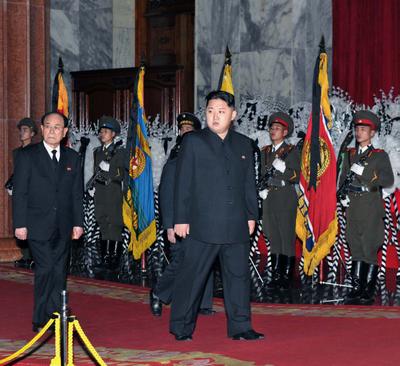There is general consensus that the leadership succession, after Kim Jong-Il’s death, has been well orchestrated and is being methodically implemented ushering in a period of stability. This stability has created a window of opportunity to put the past behind and re-open a new phase of negotiations to put in place a lasting agreement that would launch a nuclear free Korean Peninsula. Given Kim Jong-Un’s young age, this opportunity may not reoccur for a long time.
The DPRK can and should be coaxed into the global economic community by immediately opening up the international banking system and gradually lifting all sanctions that are unrelated to the nuclear issue. This will allow and encourage western companies to invest directly in the DPRK to develop its economy and export the vast mineral resources it is known to possess. The funds generated would allow the DPRK to wean itself off humanitarian aid, trade its way out of stagnation and re-establish its credibility in the Western financial markets.
Irrespective of how the West chose to judge him, Kim Il-sung had a clear vision of the DPRK as an economic ‘Tiger’ that was part of the global community, a vision that was instilled in his son and grandson. He also believed that a dynastic succession was the ‘glue’ which would hold such a system together and set about putting it in place. Though dynastic succession may be an anathema to the West, it is a philosophy that sits well within Asian culture generally.
There are precedents, most notably the 1994 Agreed Framework, that the DPRK can be convinced to enter into and abide by agreements properly negotiated, strictly adhered to and rigidly administered.
The key is for the counterparty, if it is a single entity, to settle on its negotiating strategy, establish its bottom-line, and then complete the negotiations and sign off the agreement. If, on the other hand, the counterparty is a group, it is wise to agree a single representative of the whole group, establish its negotiating strategy incorporating the collective interests of the whole group, determine the bottom-line and then negotiate, complete and sign off the agreement. Once the agreement is signed and ratified it must be strictly adhered to and rigidly administered.
The ‘Agreed Framework’ was hugely criticised as being inadequate and was indeed breached on many occasions by both sides. Nonetheless, its main provision, ‘to freeze the DPRK’s existing nuclear program and bring it under the control and supervision of the IAEA’ held firm and was not violated by the DPRK until 2001 when the US irrevocably breached the main terms of the Agreement. This gave Kim Jong-Il cause to abandon it completely, restart the DPRK’s nuclear program and accelerate its development of nuclear weapons — leaving us where we are now.
The Agreed Framework is now generally regarded as one of the major foreign policy achievements of US President Bill Clinton’s administration.
Not surprisingly it became one of the first casualties of the incoming administration of US President George W Bush in 2001. The Agreed Framework was aborted in its entirety by the Bush administration which adopted a totally different and aggressive strategy against the DPRK through sanctions focused on achieving regime change.
This policy has since been thoroughly discredited and proven to be totally ineffective and unworkable. It reflects a fundamental misunderstanding of both the resilience of the DPRK and how to negotiate with it successfully.
The expansion of the DPRK’s nuclear arsenal and the ongoing instability that pervades the Korean Peninsula can almost certainly be attributed to this single change of strategic policy.
The DPRK is of course not entirely blameless, but to abandon what was largely an effective bi-lateral agreement and then try to substitute and impose a different type of multi-lateral agreement in its place gave the DPRK the ideal opportunity to take full advantage and exploit it for its own ends.
Accepting the logic that the DPRK embarked on its nuclear path in the first place because it had itself been publically threatened by the US with such an attack (a key point forgotten by almost all diplomats and remembered only by historians), is it any wonder that it is unlikely to surrender such an effective deterrence before it is totally satisfied of its future security?
In this context the DPRK has drawn a sobering lesson from what has happened in Iraq, Afghanistan, and Libya if it accedes to a ‘surrender-your-weapons-first’ demand.
However, there is no reason why the DPRK could not be persuaded and encouraged to secure and to ‘put beyond use’ under strict supervision procedures the weapons it has already developed, and to halt and continue to dismantle its existing nuclear weapons program as it did under the ‘Agreed Framework’. In return, all sanctions both UN and others, except those pertaining to the DPRK’s nuclear weapons program, could be eased and eventually lifted in its entirety to give the DPRK the opportunity to wean itself off humanitarian aid and, as a country endowed with considerable natural resources, to ‘trade its way’ out of its economic quagmire.
The DPRK is widely known to possess very substantial mineral resources which if it were allow to develop would be of tremendous benefit not only to its own economic development but to the recovery of the global economy as well.
Colin McAskill is an independent business consultant specialising in the DPRK. His experience dealing with as well as for-and-on-behalf-of the DPRK at the highest level spans more than three decades.
An earlier version of this article was first published here by the Nautilus Institute.

